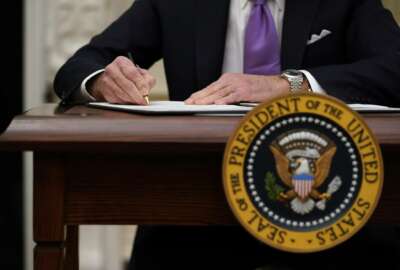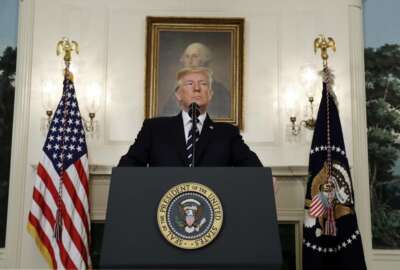
OPM gives agencies green light to recreate labor-management forums, but they’re not required
The Office of Personnel Management is reviewing a 2017 executive order from the Trump administration, which disbanded formal labor-management relations forums.
This story was updated on Wednesday, May 19, 2021 at 11:45 a.m. to reflect additional information about a national labor-management council with the National Treasury Employees Union and Customs and Border Protection, which the two parties recently restarted.
Agencies can establish labor-management forums with federal employee unions, but they’re not required while a 2017 executive order from the Trump administration, technically, remains in effect, the Office of Personnel Management said Tuesday.
The Trump administration abolished agency-union forums across the executive branch and disbanded a national labor relations council through a 2017 executive order.
The order also eliminated the requirement that agencies engage in pre-decisional involvement, a practice where employees, through their union representatives, are given an opportunity to weigh in on decisions or general policies that impact the workplace.
The 2017 order is still in effect but is under review. In the meantime, OPM has updated its guidance on the 2017 policy. The previous Trump order didn’t prescribe any particular approach to labor relations, OPM said, and federal labor law gives agencies the discretion to adopt their own strategy that best suits their needs.
“OPM believes the establishment of labor-management forums and use of pre-decisional involvement can be beneficial and useful to agencies and labor unions,” Kathleen McGettigan, OPM’s acting director, said Tuesday in a memo to agencies. “Therefore, if an agency believes establishment of these forums or use of pre-decisional involvement will be productive and elects to use them or some version of them under [labor-management relations statute], the agency is encouraged to do so.”
OPM said it issued this new guidance after fielding questions about the labor-management forums from agencies and unions. It reiterated a position that President Joe Biden first expressed in a January executive order, which stated it was the policy of the administration to “encourage union organizing and collective bargaining.”
“This is the first step by the Biden-Harris administration in resetting labor-management relations in the executive branch,” McGettigan said of the Biden order.
The EO rescinded three orders from the Trump administration and restored official time and collective bargaining procedures. But Biden’s order didn’t address the 2017 EO from his predecessor.
Both the American Federation of Government Employees and National Treasury Employees Union have long touted the utility of labor-management councils and forums. Both unions were members of past national councils.
OPM during the Obama administration said federal unions were especially useful partners in disseminating information to their members about the 2015 cybersecurity breaches.
“NTEU’s long-held belief is that open communication between labor and management is essential to the success of our federal agencies,” Tony Reardon, the union’s national president, said Tuesday. “With this new guidance, NTEU intends to encourage agencies where we represent employees to reinstate labor-management forums and grant pre-decisional involvement when it comes to workplace policies.”
Customs and Border Protection’s Office of Field Operations has already recreated a national council with NTEU, the union said. The council identified several workforce issues at its meeting in April, including long wait times for processing retirement packages and the loss of user fees during the pandemic.
“NTEU and CBP are working collaboratively on these and other concerns with the goal of improving the CBP workplace for employees and their managers and helping the agency accomplish its important missions, which is exactly how the LMRC is supposed to work,” Reardon said.
Overall, NTEU said it was pleased OPM has encouraged agencies to reestablish labor-management forums, but it supports a full revocation of Trump’s 2017 executive order.
AFGE was more critical.
“We’re surprised that the administration is giving permission to agencies to refuse to work cooperatively with their unions,” Everett Kelley, AFGE’s national president, said. “We will have to address this at the bargaining table, where we will certainly urge all agencies to exercise their discretion to engage with us around pre-decisional involvement.”
Unions are familiar with the pattern that has emerged over the years with these labor-management forums.
Former President Bill Clinton created his own version of a national labor-management relations council back in 1993. President George W. Bush disbanded it in 2001 as one of his first acts in the White House.
Former President Barack Obama recreated the national council back in 2009, calling on agencies to work together with federal employees and unions to improve the delivery of government services to the public. He signed two other executive orders in 2013 and 2015, which extended the life of the council for two more years each.
Unions weren’t surprised when Trump again disbanded the national council and agency forums in 2017, but they were especially frustrated when the prior administration said they “consumed considerable managerial time and taxpayer resources” and had “produced few benefits to the public.”
The 2017 order asked agencies to determine whether the benefits of participating in labor-management forums outweighed the costs.
Agencies who choose to stand up new labor-management forums no longer need to report those findings to OPM, the new guidance reads.
Copyright © 2025 Federal News Network. All rights reserved. This website is not intended for users located within the European Economic Area.
Nicole Ogrysko is a reporter for Federal News Network focusing on the federal workforce and federal pay and benefits.
Follow @nogryskoWFED
Related Stories





